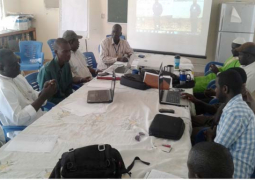The International Press Institute has condemned in strongest possible terms the recent passage of amendments to The Gambia’s Information and Communication Act, which will severely hamper press freedom, especially on the Internet, and have a strong chilling effect on journalists’ efforts to scrutinise their government. IPI urges lawmakers in The Gambia to repeal these amendments, which violate international commitments on freedom of expression.
Amendments to the Information and Communication Act, passed by The Gambia’s National Assembly on July 5, criminalises any individual in the country or abroad who: disseminates “false news” about the Gambian government or public officials, incites dissatisfaction or instigates violence against the government, or caricatures or otherwise makes derogatory statements against public officials on the Internet.
The punishment foreseen by the law for these crimes amounts to a fine of up to three million Dalasis (approximately €63.250) and/or a jail term of up to 15 years.
“The recently-passed amendments to Gambia’s communication law hinder criticism and scrutiny to those in power and as such run counter to all international standards on freedom of expression,” said IPI Executive Director, Alison Bethel McKenzie. “It is high time that the Gambian government did an about-face and respected the role of the media and the value to society of a free and independent media.”
“Lawmakers must seriously consider repealing these amendments immediately and therewith allow journalists to carry out their work to the good of democracy and the society, without fear of retaliation,” Bethel McKenzie added.
Talking to IPI, media expert Kwame Karikari, executive director of the Ghana-based NGO, Media Foundation for West Africa, explained that, “The state intelligence apparatus, the police and virtually any official of the government can determine that a publication is ‘false’.” Karikari added that the amendments “In a way are a gesture by the government to remind Gambians that the regime, or rather, [President] Yahya Jammeh, is still watching them.”
Information Minister, Nana Grey Johnson, said that the amendments were intended to prevent Gambians from engaging in “unpatriotic behaviour” against the government and public officials, “which if unchecked are a recipe for chaos and instability in any country,” Johnson said.



